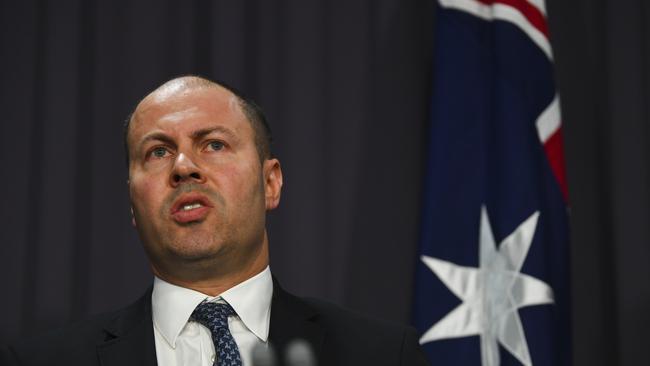Frydenberg and Lowe at last singing from same sheet
It’s taken the coronavirus’s potential to sink Australia into recession to bring the Treasurer and RBA governor out of their trenches.

It’s taken the coronavirus’s real potential to sink Australia into its first recession in almost three decades to bring Treasurer Josh Frydenberg and Reserve Bank governor Philip Lowe out from their respective trenches to work together.
And it’s not before time, as the risks around the economic outlook have grown exponentially in just a matter of weeks thanks to the global spread of the virus and the abrupt slowdown in China that has ensued.
The two men have been at odds for some time over what’s best for the economy, with the RBA slashing interest rates three times through 2019 in the face of a slowdown in growth, while Canberra doggedly stuck to its pledge of delivering a budget surplus in the year to June 30, 2020.
Lowe openly called for fiscal support of the economy. But that was ignored.
Now things have changed.
The RBA cut its benchmark interest rate on Tuesday by 0.25 per cent to a record low 0.50 per cent in response to a bloodbath on global sharemarkets last week, and news the coronavirus had spread into places including Italy and Iran.
The RBA’s interest rate cut was the first move in a joint bid with the government to settle nerves and better support the badly hit economy.
Australia sends over a third of its exports to China and is uniquely placed to feel every bump from Beijing. The hit Down Under will be severe.
It’s now over to Canberra to do its bit and roll out fiscal stimulus that will hopefully be of sufficient clout to help insulate the country from the deepening health and economic crisis.
The government has a large menu of budgetary options to select from, some larger in scale than others. It’s understood that Treasurer Josh Frydenberg will announce details on the stimulus response late next week.
The scale of Canberra’s budget package will largely determine if the RBA moves to cut interest rates again in April.
The RBA hopes it won’t need to fire off any more of its ammunition given that it only has one more shot of conventional weaponry remaining before alternative policy options are needed.
Neither Canberra nor the RBA want to go down the road of quantitative easing. Both are now working hard to avoid it.
The RBA isn’t looking for a big cash splash, but it anticipates a fiscal package of sufficient magnitude to make a difference.
Frydenberg will almost certainly announce that his coveted budget surplus has evaporated given blows from bushfires through summer and the coronavirus.
It will be hard for him to let go, but Frydenberg can take some solace from the fact that well timed fiscal support now may well steer the economy away from a recession.
Struggling in opinion polls after a slow initial response to savage bushfires in December, the government can ill afford to be late to economic emergency too.
Negative GDP growth for the economy
Economists have already booked in negative GDP growth for the economy in the first quarter due to the coronavirus. If the effects of the virus don’t dissipate over coming months, the second quarter may be worse than the first.
There’s only a few economic policy makers left that can recall Australia’s last recession in the early 1990s. Thankfully, two of them occupy the top positions of power at the RBA.
Recessions have a tendency to smash small businesses and drive up unemployment. There’s nothing pretty about corporate collapses and growing queues of the long-term unemployed either.
So it’s good that Canberra and the RBA are now at last “highly aligned” as Prime Minister Scott Morrison describes it.
The narrative from both the RBA and the government going forward will be about working together to get through “these uncertain times”, while highlighting that the government’s strong fiscal position has allowed it to act with some force.
Frydenberg will be focused on the themes of jobs, cashflow and investment, all things that should reassure Lowe.
The good news for Australia is that Canberra and Martin Place in Sydney have joined forces, meaning the strongest defence against the economic threat will now be mounted.
Dow Jones Newswires







To join the conversation, please log in. Don't have an account? Register
Join the conversation, you are commenting as Logout